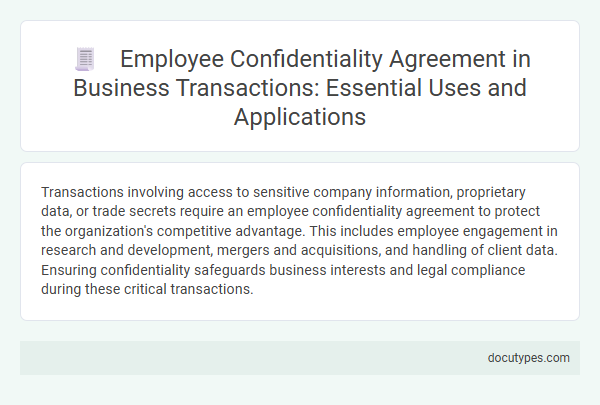Transactions involving access to sensitive company information, proprietary data, or trade secrets require an employee confidentiality agreement to protect the organization's competitive advantage. This includes employee engagement in research and development, mergers and acquisitions, and handling of client data. Ensuring confidentiality safeguards business interests and legal compliance during these critical transactions.
Introduction to Employee Confidentiality Agreements
Employee confidentiality agreements protect sensitive company information from unauthorized disclosure. These agreements outline the employee's responsibility to maintain confidentiality during and after their employment.
Transactions involving proprietary data, trade secrets, and client information typically require an employee confidentiality agreement. Such agreements are essential in industries like technology, finance, and healthcare where data privacy is critical.
Key Elements of an Employee Confidentiality Agreement
Employee confidentiality agreements protect sensitive information during various transactions, including employment onboarding, project collaborations, and business acquisitions. These agreements ensure that proprietary data, trade secrets, and client information remain secure.
Key elements include defining confidential information, outlining employee obligations, and specifying the duration of confidentiality. Your agreement should also address consequences of breaches and procedures for handling confidential materials. Clear terms help safeguard company assets and maintain trust in all business dealings.
Importance of Confidentiality in Business Transactions
Confidentiality in business transactions safeguards sensitive information, protecting company strategies, trade secrets, and client data from unauthorized disclosure. Transactions involving mergers, acquisitions, intellectual property transfers, or partnership negotiations typically require an employee confidentiality agreement.
Such agreements ensure that employees understand their obligation to maintain secrecy, preventing competitive disadvantages and legal issues. You benefit from these protections by securing your company's valuable assets and preserving trust in all business dealings.
Legal Foundations and Compliance Requirements
Employee confidentiality agreements are legally required for transactions involving sensitive company information, trade secrets, and proprietary data protection. Regulatory compliance mandates such agreements in sectors like finance, healthcare, and technology to safeguard intellectual property and maintain data privacy standards. Ensuring these agreements align with employment and contract law minimizes legal risks and enforces confidentiality obligations effectively.
Protecting Trade Secrets and Proprietary Information
Transactions involving access to sensitive company data, proprietary technology, or trade secrets require an Employee Confidentiality Agreement to ensure protection. This agreement safeguards your employer's intellectual property and prevents unauthorized disclosure during and after employment. Ensuring confidentiality during mergers, acquisitions, or collaboration projects is essential to maintaining competitive advantage and complying with legal obligations.
Roles and Responsibilities of Employees
| Transaction Type | Employee Roles Involved | Confidentiality Responsibilities |
|---|---|---|
| Access to Proprietary Information | Research and Development Staff, Product Designers | Maintain secrecy of trade secrets, design documents, technical data |
| Handling Client Data | Sales Representatives, Customer Support, Account Managers | Protect client identities, transaction details, personal data |
| Financial Transactions | Finance Team, Accounting Staff, Procurement Officers | Ensure confidentiality of budgets, pricing strategies, payment details |
| Strategic Planning and Mergers | Executive Management, Legal Department, Strategic Planners | Prevent disclosure of merger plans, business strategies, confidential negotiations |
| Software Development and IT Access | IT Personnel, Software Engineers, System Administrators | Protect source code, system configurations, user data from unauthorized access |
| Marketing Campaigns | Marketing Team, Advertising Specialists | Keep campaign strategies, budgets, and market research confidential |
| Manufacturing Processes | Production Staff, Quality Control Inspectors | Secure proprietary manufacturing methods, quality standards, supplier information |
| Human Resources Activities | HR Personnel, Recruiters, Payroll Staff | Confidential handling of employee records, payroll data, recruitment plans |
Types of Information Covered under Confidentiality
Which types of information require an Employee Confidentiality Agreement to protect business interests? Confidentiality agreements typically cover trade secrets, client lists, financial data, and proprietary technologies. Your agreement ensures sensitive information remains secure during and after employment.
Consequences of Breaching Confidentiality Agreements
Certain transactions require an Employee Confidentiality Agreement to protect sensitive company information. Breaching these agreements can lead to severe legal and professional consequences.
- Legal Action - Violating a confidentiality agreement may result in lawsuits seeking damages or injunctions against further disclosure.
- Employment Termination - Breach of confidentiality often leads to immediate dismissal due to trust violations and company policy enforcement.
- Reputational Damage - Disclosure of confidential information can harm both the employee's and the company's reputation, affecting future opportunities.
Best Practices for Implementing Confidentiality Agreements
Confidentiality agreements are critical for protecting sensitive information during various business transactions. Identifying which transactions require these agreements helps maintain your company's competitive edge and legal compliance.
- Employee Access to Proprietary Information - Confidentiality agreements are essential when employees handle trade secrets, client data, or financial reports.
- New Hire Onboarding - Implementing confidentiality agreements during onboarding ensures new employees understand their obligations to protect company information from day one.
- Project Collaboration - When employees collaborate on projects involving sensitive data, confidentiality agreements safeguard against unauthorized disclosure or misuse.
Which Transactions Require an Employee Confidentiality Agreement? Infographic

